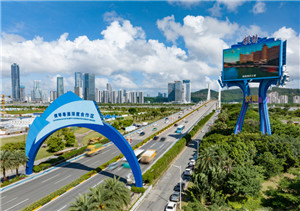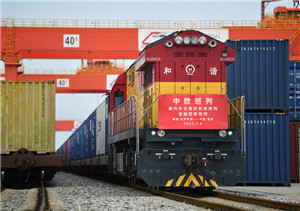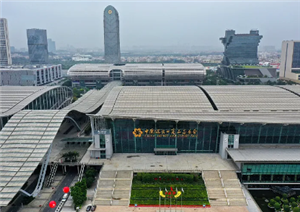The Guangdong-Hong Kong-Macau Greater Bay Area (GBA) is one of the most open, economically vibrant and populous regions in China. Five years ago, the Outline Development Plan for the Guangdong-Hong Kong-Macau Greater Bay Area was released, and Guangzhou was designated as a core engine for regional development.
To align with international business rules, tax authorities in Guangzhou focused on the main task of being based in the GBA, coordinating with Hong Kong and Macau, and connecting with the world. They have seized the strategic opportunities presented by the "Master Plan of Guangzhou Nansha on Deepening Comprehensive Cooperation between Guangdong, Hong Kong and Macau with a Global Perspective" (or the Nansha Plan) to make breakthroughs in areas such as aligning with tax regulations in Hong Kong and Macau, releasing the dividends of tax incentives, easing the unified processing of tax matters, promoting cross-border cooperation on tax governance, and gathering professional financial and tax services.
These efforts aim to create a tax and business environment beneficial to comprehensive cooperation, adapt to a high-level opening-up effort and satisfy the needs of market entities, thus opening a new chapter of tax services for the high-quality development of the GBA.
Building a tax incentive bridge
Considering the significant differences in tax systems, legal frameworks and taxation methods in the GBA, a better alignment of the former can facilitate the free flow of capital, goods, services and talent to provide more opportunities and favourable conditions for local enterprises and residents. Moreover, aligning with global tax rules can help attract more international capital, enterprises and talent.
The Nansha Plan was released in June 2022. The three tax preferential policies garnered significant attention, especially the preferential policy for individual income tax, which has benefited around 470 Hong Kong and Macau residents working in Nansha. On average, their tax has decreased by more than 50 per cent, or a total of 37 million yuan.
"I have received tens of thousands of RMB in tax refunds. This policy encourages young people from Hong Kong to work and live in Nansha," said Zeng Zhaoming, vice-president of APT Electronic Co., Ltd. While significantly reducing individual income tax for Hong Kong and Macau residents working in Nansha, the policy also helped enterprises attract high-level tech talent from those areas, thereby enhancing core competitiveness.
To fully unleash the tax benefits of the Nansha Plan, the tax authorities in Guangzhou have introduced the "Rule Alignment Bridge" mechanism. This helps to precisely align the individual income tax policies in Nansha with the salary and profit tax in Hong Kong, and the professional and complementary tax in Macau. The Guangdong E-tax Bureau has added a module that includes a tax reduction calculator for Hong Kong and Macau residents. It aims to simplify complex processes including tax rule conversions and calculations between Hong Kong, Macau and the mainland by making them automatic, intelligent and convenient.
The Nansha Plan also grants a 15 per cent reduction in corporate income tax to certain endorsed enterprises and an extension of the tax loss carry-forward period to key hi-tech enterprises. Tax authorities in Guangzhou have established special teams to provide one-on-one services for enterprises that intend to settle in Nansha. More than 30 enterprises have benefited from this policy.
Measures have also been implemented to allow tax professionals from Hong Kong and Macau to provide tax-related services in Nansha after registration. Currently, eight have registered.
Joint workshop
Guangzhou Tax Service, State Taxation Administration; Hong Kong and Macau Affairs Office of the Guangzhou municipal government; and Nansha district government, jointly launched a workshop aimed to promote deeper cooperation between the three regions. The workshop facilitated cross-regional and cross-sector collaboration among all stakeholders.
It also helped to initiate the first batch of joint projects between the three regions. The authorities will establish an interactive platform and mechanism to address practical issues that Hong Kong and Macau enterprises and individuals could encounter in Guangzhou. They will also regularly communicate and cooperate on policies related to Hong Kong and Macau, cross-border investment and business operations. Innovative measures will be taken to facilitate the integration of production factors and industrial policies between the three regions, and to advance the establishment of modern tax governance in the GBA.
GBA Tax Handling pilot demonstration
Featuring smart service counters, GBA Tax Handling integrated common tax payment channels such as the electronic bureaus, self-service systems and remote filing in Shenzhen and Guangdong. The platform offers 57 kinds of service, including inquiries, certificate processing and social insurance fee handling. Additionally, services such as AI-remote assistance and on-site self-service-online guidance are provided.
GBA Tax Handling self-service terminals were set up in Tianhe District, Guangzhou in February 2023. A total of 58,003 transactions have been processed for taxpayers and fee payers, which include 39,209 tax transactions, 8,068 V-Tax remote filings, 6,130 self-service filings, 4,170 individual electronic tax transactions and 426 transactions of cross-regional services in Shenzhen.
Guangzhou has established nine GBA Innovation and Entrepreneurship Tax Service Stations and five Hong Kong-Macau Youth Innovation and Entrepreneurship Tax Service Bases. Multilingual young volunteer teams provide whole-process customised services that include intelligent self-service tax filing, green service channels and one-on-one guidance.
"I started my business at the Hong Kong-Macau Youth Home in Tianhe and enjoyed convenient services and guidance on tax matters," said Wang Shaohui, a young Hong Kong entrepreneur who has been doing business in Guangzhou for over 10 years.
Launch of the tax service platform for inbound and outbound investment
In addition to the differences in tax systems and procedures, taxpayers' habits are also quite different in the GBA. Hence, Guangzhou authorities have established service centres and introduced several innovative intelligent services to continuously enhance the cross-border tax filing experience in the GBA.
The province's first smart platform provides integrated information release and contactless tax services for enterprises. It can be accessed through various channels, including the official website or the WeChat official account of the Guangzhou Tax Service, State Taxation Administration; Guangzhou Municipal Commerce Bureau; Hong Kong Trade Development Council; and Serve Silk Road.
The smart platform is available in both Chinese (simplified and traditional) and English. In addition to information inquiries, policy guidance, service interaction and risk warning, the platform provides access to smart services such as a quick search for tax treaties between China and other countries, rapid calculation of days of residence for non-resident individuals, online applications for the Certificate of Chinese Fiscal Residents, International Tax Payment Connect and the 12366 tax service hotline.
Tax service demonstration base in the CSGKC
China-Singapore Guangzhou Knowledge City (CSGKC) is the only national-level international cooperation platform in the GBA. Guangzhou tax authorities have established tax service demonstration bases in the China-Singapore Smart Park and Ascendas OneHub GKC, where most of the foreign enterprises are based.
The "Cooperation Mechanism" was also released, which includes pre-approval for investment promotion, one-stop services for overseas investment, integrated data sharing, standardised regulatory coordination, regular tax publicity, targeted in-depth investigation, services tailored for key projects, and green channels for relief of overseas tax risks. The focus was to promote these services and boost the high-quality development of regional investment.
Advance rulings for complex international tax matters
Certainty and uniformity in tax enforcement are the two most-raised concerns of businesses. Tax authorities in Guangzhou and Shenzhen jointly launched the advance rulings for complex international tax matters to ensure tax certainty for multinational enterprises engaged in cross-border investment and to reduce their tax costs. Relevant measures include establishing a joint assessment agency, defining analytical standards, unifying service processes and preparing relevant documents. This approach will allow enterprises in Guangzhou and Shenzhen to handle businesses more efficiently.
In addition, the cross-border tax service standards for the GBA have been issued to promote the alignment of rules on tax and fee services. With the aid of information technologies such as big data and cloud computing, the authorities have launched services that include intelligent reminders and active recommendations for value-added, consumption and vehicle purchase taxes, as well as easy refunds for corporate income tax.
"Guangzhou tax authorities will continue to benchmark international best practices and establish a heart-to-heart bridge of cooperation with our counterparts in Hong Kong and Macau," said Zhang Qiaozhen, party committee member and deputy director of the Guangzhou Municipal Tax Service.
"Focusing on smart taxation, regulatory innovation and an optimised business environment, we strive to promote tax compliance in society, explore new pathways for integrated cooperation and inject tax momentum into the development of the GBA."

















